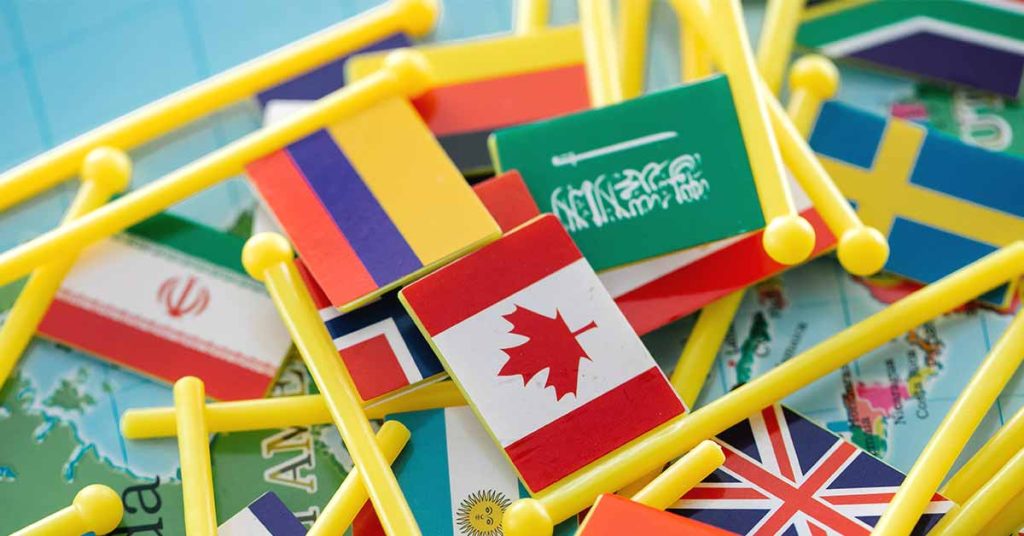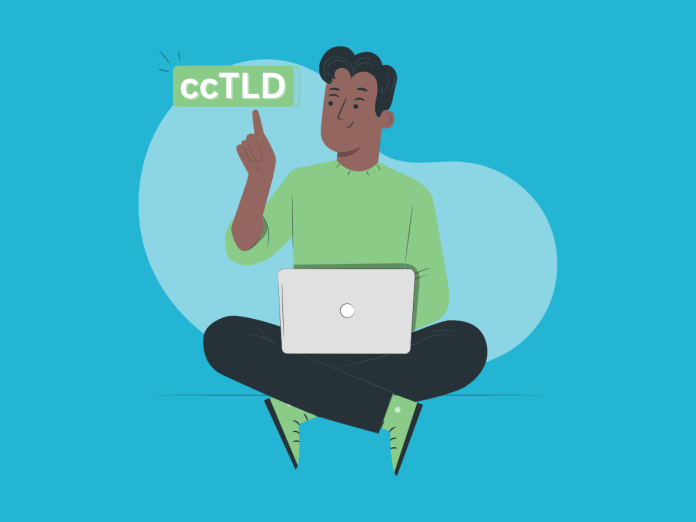If you’ve ever come across web addresses like “example.co.za“, you might have wondered what the “.co.za” represents. It’s a country code top-level domain (ccTLD) that indicates the website’s association with a specific country or region. In this guide, we’ll explore the world of ccTLDs and shed light on their significance for businesses and website owners.
Table of Contents
What Is a ccTLD? Exploring Country Code Top-Level Domains (ccTLDs)
A ccTLD, or country code top-level domain, is a two-letter domain name extension that represents a specific country, sovereign state, or dependent territory. These domains are a way to show search platforms and users the geographical area associated with a website. For example, in the domain “example.co.za“, the “.za” part indicates that the website is specific to South Africa. While ccTLDs are primarily assigned to countries, some major business hubs may also have their own ccTLDs, such as .eu for the European Union.
ccTLDs are the single strongest way to show search engines the target country or area of a website
Unlike generic top-level domains (TLDs) such as “.com” or “.org,” ccTLDs are the single strongest way to show search engines the target country or area of a website. Major search platforms like Google assume that a ccTLD is associated with the respective country, allowing businesses to rank better in geotargeted search results.
The ZA Registry Consortium (ZARC) is responsible for determining the naming conventions of domain names in South Africa, including the ccTLD “.za.” As the administrator of the .za domain space, the ZARC oversees the registration and management of domain names under various second-level domains within the .za namespace. Operating under the authority of the Internet Corporation for Assigned Names and Numbers (ICANN), the global governing body for domain names, the ZARC ensures compliance with international standards.
Learn more about domain terms in our complete domain glossary.
Advantages of Using ccTLDs for Your Domain
Choosing a ccTLD for your website comes with several advantages, especially if you’re targeting a specific geographic location. Let’s take a closer look at some of the benefits:

- Local Identity: If you’re looking to expand your business in a specific region, having a ccTLD can give you a competitive edge. It establishes a local identity and makes it easier for potential customers to find you online. A ccTLD demonstrates that you are invested in serving the needs of the local market.
- Improved SEO: Search engine optimisation is crucial for online visibility, and ccTLDs can significantly boost your organic search efforts. Since ccTLDs are associated with specific locations, search sites are more likely to display relevant websites in local search results, helping you reach your target audience effectively.
- Targeted Marketing: ccTLDs allow you to tailor your marketing campaigns to a specific region. When users see a ccTLD that matches their country, they’re more likely to trust your website and engage with your content. This targeted approach can lead to higher conversion rates and improved brand recognition.
- Enhanced Credibility and Trust: When users see a ccTLD that matches their country, it instils a sense of trust and credibility. They are more likely to click on search results or visit websites that appear to be local.
The Impact of ccTLDs on Search Engines and SEO
When it comes to search engine optimisation, ccTLDs play a vital role in enhancing your website’s visibility. Search platforms consider the ccTLD as a strong indicator of a website’s relevance to a specific country. By choosing a ccTLD, you can convey to search sites that your content is specifically targeted to users in that geographic area, thereby increasing your chances of ranking higher in local search results.
For example, if you’re running a business in South Africa and have a website with a “.co.za” ccTLD, Google assumes that your website is intended for users in South Africa. This geotargeting helps your website rank better in search engine result pages (SERPS) when users from South Africa search for relevant keywords.
ccTLDs are not the only factor influencing search rankings. Content quality, relevance, backlinks, user experience, and other SEO best practices still play significant roles
It’s important to note that ccTLDs are not the only factor influencing search rankings. Content quality, relevance, backlinks, user experience, and other SEO best practices still play significant roles. However, using a ccTLD gives your website an advantage in localised search results.
Examples of Popular ccTLDs Around the World
ccTLDs are assigned to each country or area based on the ISO 3166-1 alpha-2 country codes. Let’s explore some popular examples of ccTLDs from around the world:
- .uk: The United Kingdom is represented by the “.co.uk” ccTLD, which is widely used by businesses, organisations, and individuals in the UK.
- .fr: This extension for France is used by websites targeting the French market. It signifies a connection to the French language and culture.
- .cn: This ccTLD for China represents one of the world’s largest online markets. It is widely used by businesses targeting the Chinese audience. As of January 2023, there were 26.57 million “.cn” domains registered.
- .de: Germany is represented by “de” and is highly recognised and trusted among German users. It signifies a website’s relevance to the German market.
- .au: Australia’s extension, “.au,” is popular among Australian businesses and helps them establish a strong online presence within the country.
- .us: The “.us” extension represents the United States and is commonly used by businesses and individuals targeting the American market.
- .nz: New Zealand’s ccTLD, “.nz,” is utilised by businesses and organisations aiming to reach the local audience in New Zealand.
- .nl: The Netherlands is represented by the “.nl” extension, which is used by Dutch businesses, institutions, and individuals.
- .jp: The ccTLD for Japan represents websites focused on the Japanese market. It is a valuable asset for businesses wanting to establish a presence in Japan.
Each country has its own ccTLD, providing a unique identifier for websites associated with that country or location. To see a comprehensive list of ccTLDs available worldwide, you can visit the database from the official website of the Internet Assigned Numbers Authority (IANA).
Considerations When Registering and Using ccTLDs
Before registering a domain for your website, it’s essential to consider a few factors:
- Eligibility: Some ccTLDs may have specific registration requirements. For example, certain ccTLDs may only be available to businesses or residents of a particular country. Ensure that you meet the eligibility criteria before purchasing a ccTLD. This requirement ensures that the ccTLD is used by entities with a local presence in the region.
- International SEO: While ccTLDs are effective for geotargeted search optimisation, they may not be the best choice if you’re targeting a global audience. In such cases, using a gTLD like “.com” or “.org” might be more suitable.
- Target Audience Research: Before choosing a ccTLD, conduct thorough research on your target audience. Understand their demographics, preferences, and online behaviour. This knowledge will help you select the most relevant ccTLD and tailor your website’s content and offerings accordingly.
- Localise Your Content: To maximise the benefits of a ccTLD, ensure that your website’s content is specifically targeted to the associated country. Tailor your messaging, language, and offerings to resonate with the local audience.
- Brand Consistency: If you have an established brand and online presence, a ccTLD might impact your brand consistency. Consider the implications of changing your domain extension and ensure it aligns with your branding strategy.
- Domain Security: Protecting your domain from unauthorised access or domain hijacking attempts is paramount. As a reputable web hosting company, MCloud9 offers free domain security to safeguard your online assets. By choosing a domain registrar or web hosting company, like MCloud9, you can ensure that your ccTLD is protected with industry-standard security measures.
To register a ccTLD for your website, you can follow the step-by-step guide provided in our article on How to Register a .co.za Domain Name: Simplified for Beginners. Use the domain tool below to see if your .co.za domain is available.
Domain Name Search
Instantly search domain name availability
FAQ for What Is a ccTLD
Are ccTLDs available for all countries in the world?
While almost every country has a unique domain assigned to it, there are exceptions. Some countries may not have a ccTLD assigned to them, while others may share a ccTLD due to geographical or political reasons.
Can I switch from a gTLD to a ccTLD?
If you want to localise your website, you can. It is possible to switch from a generic top-level domain to a country-specific domain extension However, it’s important to consider the potential impact on your SEO, branding, and existing online presence.
In Conclusion
In conclusion, ccTLDs are an effective way to show search engines and users the geographic relevance of your website. By registering a ccTLD associated with your target country, you can enhance your SEO efforts, establish a local identity, and gain the trust of your target audience. MCloud9 offers affordable domains along with free domain security. You can also qualify for a free domain for your first year with a web hosting plan. So, whether you’re an entrepreneur starting an online business or a website owner looking to expand your reach, consider the benefits of ccTLDs and make an informed decision for your online presence.


